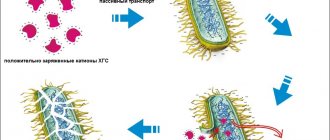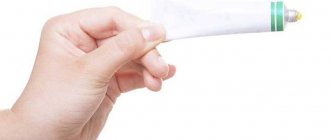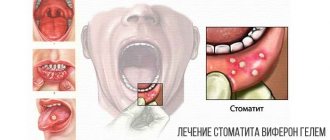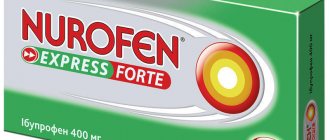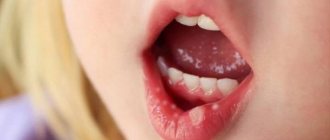04/08/2018 Olga Migunova 2 comments
One of the most common antipyretic medications are fever suppositories for children. Pediatricians recommend their use for children who, due to their age, are not suitable for tablet forms of medications - due to the frequent occurrence of allergic reactions and the inability to swallow the capsule.
When is it necessary to reduce a child’s temperature?
The appearance of a fever indicates the body’s beginning to fight the infectious agent and the production of interferon - a specific protein aimed at destroying the virus. Doctors do not advise lowering body temperature to 38 degrees – the autoimmune system must independently suppress a lower level.
However, babies react differently to elevated temperatures - for some it does not cause behavioral abnormalities, for others they lose consciousness. Indicators above 38 units negatively affect the body and require the appointment of third-party auxiliary agents to suppress the activity of the infection that has entered the body.
Experts recommend paying attention to accompanying symptomatic manifestations:
- state of general weakness;
- complaints of headache;
- problems with free breathing through the nasal passages;
- feverish conditions - chills;
- severe lacrimation.
Children's suppositories for fever are prescribed by the local pediatrician. Uncontrolled use of medications can negatively affect the functionality of the cardiovascular department.
When should you use suppositories?
The temperature in children should be brought down if it has crossed the mark of 38.5˚C, and in infants up to one year it is 38.2˚C . It is highly not recommended to act until this point, as this can weaken immunity that has not yet strengthened . In some cases, if convulsions are observed with a sharp increase, you should respond immediately.
Suppositories are the most convenient form of antipyretics . It is very difficult for children to swallow a pill, because “it is bitter and disgusting.” Syrups are also not always appropriate. Very often , fever is accompanied by nausea and vomiting , and in such conditions is very difficult to drink a spoonful of syrup, just like a pill.
Another significant advantage for children is that when administered rectally (into the rectum), the active substances are released faster and immediately absorbed into the blood, while the tablet only begins to break down in the stomach. This is very important if your baby has a severe fever.
Advantages and disadvantages of antipyretic suppositories
The suppositories in the home medicine cabinet must be appropriate for the child’s age. Pharmacy chains offer a large number of suitable options - for babies from birth to school period.
The positive qualities of this type of medicine are presented:
- rapid positive effect - the active ingredient is rapidly absorbed into the intestinal mucosa, enters the bloodstream and reduces the temperature in the shortest possible time (up to 45 minutes);
- antipyretic suppositories for children are suitable for infants - those who are still breastfed;
- drugs can be administered even to a sleeping baby;
- lack of irritation of the mucous membranes of the gastrointestinal tract;
- prolonged period of action - unlike other medications.
Temperature candles do not contain flavorings, food colors or sweeteners. Medicines are considered the best option for young children, especially those suffering from spontaneous allergic reactions. Medicines help reduce the temperature level at the time of constant vomiting - which is an important feature for some infectious lesions.
The main disadvantages of rectal suppositories include:
- resistance of children over one year old when trying to use suppositories;
- sudden bowel movement, after which repeated use of the medication is required.
Temperature suppositories for infants have clear advantages over all other forms of medications. Syrups and tablets are undesirable or directly contraindicated for use during this period.
Dosage for newborns and children under 12 years of age
The dosage regimen depends on the child’s body weight. The annotation for the drug (instructions for use) states that it can be used once or repeatedly.
Important! The effect of Cefekon lasts from 4 to 6 hours.
The 50 mg suppositories are prescribed to newborns from 1 to 3 months. Suppositories of 100 mg (1 piece) are prescribed at the age of 3 months to 1 year. For a child 1–3 years old, weighing 11–16 kg, it is recommended to administer 1–2 suppositories at a time.
At the age of 3 to 10 years, the maximum daily dose is 750 mg. That is, 3 suppositories are administered at a temperature of 0.25 g each, leaving 6 hours between each administration. Children from 10 to 12 years old, whose weight exceeds 30 kg, are prescribed 2 suppositories of 0.25 g (500 mg).
How often can Cefekon rectal suppositories be used? In a single dose, the drug is administered 2-3 times a day, every 4-6 hours. A maximum of 60 mg/kg body weight can be used.
How long does it take for Cefekon to work? The effect of the drug begins to be felt 30 minutes after administration.
The most popular antipyretic suppositories
Pediatric doctors often prescribe antipyretic suppositories because of their high effectiveness and low number of adverse reactions. Not having to swallow tablets is an advantage of rectal therapy for children under three years of age.
For newborns
During this period, doctors recommend adhering to the rules for administering suppositories and not self-medicating. However, you should familiarize yourself with the popular antipyretic suppositories that doctors often prescribe for babies.
Viferon
Refers to effective medicines approved for use from the first day after the birth of the child. Externally, the medication resembles a bullet with a yellow tint; the main active ingredient is interferon.
The pharmacological agent is aimed at combating viral infections and helps increase the functionality of the immune system. Babies up to 30 days old are given a minimal amount of the substance. The maximum allowed amount of the drug is two suppositories, used with an interval of 12 hours.
Genferon
The medication also contains interferon; dosage levels depend on the age of the child. The drug quickly reduces body temperature and has an analgesic effect due to the presence of benzocaine and anesthesin.
The substance is rapidly absorbed by the intestinal mucosa; Genferon is suitable for children after the first month of life. Negative reactions of the body manifest themselves in the form of burning or itching at the injection site or on the skin.
Before reaching seven years of age, the maximum daily dosage does not exceed one suppository, after that - up to 2 medicinal suppositories.
For children under one year old
The list of popular medications includes the safest substances approved by clinical trials. Pediatricians recommend the following medications.
Efferalgan
The main active component of the drug is paracetamol; the candles are made with a glossy, white finish. The required effectiveness of application is registered after two hours.
An absolute contraindication for the use of suppositories is diarrhea. A weakened intestine may be subject to additional negative effects of paracetamol. The manufacturer does not recommend the simultaneous use of suppositories and other forms of medications containing the same main ingredient.
Efferalgan is prohibited for use until the first 30 days of life. In the first five months, the maximum daily dosage should not exceed one suppository; from six months to 3 years, 150 mg of the drug is allowed. After reaching the age of 3, children are prescribed up to 300 mg of medication, therapy is carried out for 5 days.
The main negative reactions to substance use are presented:
- impaired glucose metabolism;
- hemorrhages;
- hypoglycemia;
- encephalopathy;
- Quincke's edema and anaphylactic shock;
- rashes on the skin.
Tsefekon
It is characterized by the main active ingredient paracetamol, and an additional ingredient – vitaxone. The drug is not intended for children under the first month of life, with increased sensitivity to the active substance and at the time of inflammatory processes occurring in the rectum.
The medication is administered only after a cleansing enema; the use of up to 3 suppositories is allowed. The dosage calculation depends on the baby’s body weight - 15 mg per kilogram. The maximum allowed amount per day is no more than 60 mg.
Ibuprofen
Refers to anti-inflammatory drugs of non-steroidal origin. One unit of the medicine contains 60 mg of the active ingredient - ibuprofen. Prescribed to infants from 3 months to 6 years, with inflammatory, infectious lesions with accompanying high body temperature.
The amount of substance used depends on body weight, age and ongoing disease. For babies up to 9 months and weighing up to 8 kg, the drug is prescribed one piece, up to three times a day. After the specified age period, four-time use is allowed.
Viburkol
Refers to homeopathic medications used as an antipyretic. The main composition includes anemone, plantain leaves, belladonna extract, chamomile flowers. In addition to lowering the temperature, the medication has a sedative effect.
Allowed for use after the first six months of life; in case of allergic reactions to medicinal plants, replacement with more suitable medications is required. On the first day, up to 3 pieces are administered - with an interval of half an hour. In the following days, the medicine is divided into two doses - in the morning and evening.
The dosage level is set by the pediatrician, depending on the age period.
For children over one year old
Babies after 12 months do not always react positively to rectal suppositories. Negativism may be based on incorrect administration of drugs and personal rejection of this type of treatment. It is impossible to lower the temperature by force (by introducing suppositories) - this will cause an even greater deterioration of the condition.
Panadol
Contains the active ingredient paracetamol. May provoke negative reactions in the body:
- thrombocytopenia;
- agranulocytosis;
- anemic conditions;
- local allergic rashes on the surface of the skin;
- renal type colic.
Prohibitions on use are presented:
- up to 2 months of age;
- significant sensitivity to the ingredients included in the composition;
- congenital form of hyperbilirubinemia;
- serious impairment of kidney or liver function;
- genetic tolerance to fructose;
- anemic conditions;
- leukopenia.
Analdim
Refers to analgesics of non-narcotic origin, with approval for use in children. The positive effectiveness of the drug is represented by anti-inflammatory, antipyretic and analgesic effects.
The main composition includes two active components - analgin and diphenhydramine. This combination allows you to achieve maximum results in therapy. The medication is prohibited for use until the first year of life; in the next three years it is used with extreme caution.
The required amount for children after three years is determined by the child’s body weight.
Diclofenac
Intended for children over 6 years of age with rheumatoid and other joint lesions. The main spectrum of influence of the drug is anti-inflammatory, then antipyretic and analgesic. The product is not used for bleeding from the rectum and diseases in the anorectal area.
Candles to reduce fever in children
Most children's suppositories for fever are based on paracetamol. Compared to ibuprofen, this active substance has a minimal list of side effects, for this reason it has a delicate effect on the body that has not yet become stronger, although ibuprofen-based drugs are also considered safe for children. When choosing a particular drug, you need to pay attention to the age at which it is approved.
Article on the topic: Choosing analogues of the drug Sirdalud: studying the instructions, comparing prices
Nurofen
These fever suppositories for children are based on ibuprofen. Of the additional components in the composition, solid fat 1 (vitepsol H15) and solid fat 2 are found. The drug exhibits the following properties:
- anti-inflammatory;
- pain reliever;
- antipyretic.
Nurofen acts for 8 hours. Its advantage is a high level of absorption in the body. Nurofen is allowed from 3 months of age. It is used for the following diseases:
- childhood infections;
- acute respiratory diseases;
- flu;
- otitis;
- reactions after vaccinations;
- headache and toothache;
- neuralgia;
- teething.
The price of 10 Nurofen candles is 80–100 rubles. Suppositories are used exclusively rectally. A single dosage is calculated taking into account the weight and age of the baby. The average dose is 5–10 mg per 1 kg of body weight. Depending on age, it can be:
- 1 candle 3 times a day with an interval of 6–8 hours – for ages from 3 to 9 months;
- 1 candle up to 4 times a day with 6-hour breaks - from 9 months to 2 years.
For fever after vaccination, 1 suppository is prescribed for children under 1 year of age. In older children, repeated administration is possible after 6 hours. Nurofen should not be used for more than 3 days. The list of contraindications for the drug includes:
- high sensitivity to acetylsalicylic acid, ibuprofen;
- active bleeding from the gastrointestinal tract (GIT);
- urticaria, rhinitis, bronchial asthma;
- erosions and ulcers of the gastrointestinal tract;
- liver and kidney failure;
- hearing loss;
- blood diseases;
- hyperkalemia.
Nurofen is used with caution for ulcerative colitis, gastritis and a history of peptic ulcer. Side effects after administration of the suppository may include:
- dizziness;
- allergy;
- insomnia;
- headache;
- diarrhea;
- epigastric pain;
- exacerbation of bronchial asthma;
- itching, urticaria, bronchospasm;
- tachycardia;
- cystitis;
- renal dysfunction.
Viburkol
This drug belongs to the homeopathic category. An auxiliary component of its composition is solid fat. The list of active components includes:
- common chamomile;
- plantain extract;
- belladonna extract;
- meadow lumbago juice;
- carbonated lime.
The cost of Viburkol varies between 350–400 rubles for 12 suppositories. The drug exhibits anticonvulsant, sedative, analgesic, anti-inflammatory and antipyretic effects. The main indication for its use is respiratory diseases. Viburcol is also used in cases of teething. The advantage of the medication is the minimum of side effects. After the introduction of a suppository, sometimes only the development of allergic reactions is noted.
Contraindications include hypersensitivity and individual intolerance to the composition of Viburkol. The dosage is determined taking into account the following principles:
- 2 suppositories per day – up to six months;
- 4 suppositories per day at a temperature of 37.5 degrees – over 6 months of age;
- 6 suppositories per day, if the temperature is above 38 degrees - for children from six months;
- 1 suppository 1-2 times daily in a course of 3-4 days - when the temperature normalizes.
Tsefekon D
The active component of Cefekon D is paracetamol. Witepsol is used as the fatty base of the candle. The package contains 10 suppositories of 50 mg or 100 mg. Their cost varies between 30–50 rubles. Cefekon D exhibits the following properties:
- antipyretic;
- analgesic;
- mild anti-inflammatory.
As an antipyretic, Cefekon D is used for acute respiratory viral infections, influenza, childhood infections, and post-vaccination reactions. After vaccinations at the age of 1–3 months, the medication is used once and only under the supervision of a doctor. In general, the drug is approved from 3 months of age. The dosage is determined as follows:
- 1–2 pieces of 100 mg – from 3 months to 1 year with a weight of 6–10 kg;
- 1–2 pcs. 100 mg – from 1 to 3 years with a body weight of 10–15 kg;
- 1 PC. 250 mg – from 3 to 10 years with a weight of 16–32 kg;
- 2 pcs. 250 mg – from 10 to 12 years with a body weight of 33–36 kg.
Cefekon D is not recommended for long-term use. The duration of treatment is 3 days. The list of contraindications includes the following pathologies and cases:
- hypersensitivity to paracetamol;
- severe liver or kidney dysfunction;
- enzymatic absence of glucose-6-phosphate dehydrogenase;
- diseases of the circulatory system;
- age up to 1 month.
Article on the topic: Hemiataxia - what causes unilateral loss of coordination of movements
After administration of the suppository, allergic reactions may develop, for example, itching or rash on the skin and mucous membranes. Some patients experienced the following side effects:
- leukopenia;
- agranulocytosis;
- nausea, vomiting;
- anemia;
- spasms along the intestines;
- papillary necrosis;
- interstitial nephritis;
- hemolytic anemia.
Genferon
The cost of 10 Genferon suppositories is 350–400 rubles. The basis of the drug is recombinant human alpha-2 b interferon, benzocaine, taurine, anesthesin. Thanks to these substances, Genferon exhibits the following properties:
- antibacterial;
- antiviral;
- immunomodulatory;
- local anesthetic;
- normalizing metabolic processes in tissues;
- regenerating;
- antioxidant.
The drug is effective against bacteria and viruses. The daily dosage for infants and children under 7 years of age is 125 thousand IU (1 candle), and for older children - 250 thousand IU (2 pieces). Contraindications for Genferon include increased sensitivity of interferon, the first 4 weeks of life, exacerbations of immune diseases. Possible side effects include:
- headache;
- thrombocytopenia;
- leukopenia;
- hyperthermia;
- sweating;
- pain in joints and muscles;
- loss of appetite;
- skin rash and itching.
Analdim
The composition of Analdim includes diphenhydramine and analgin (metamizole sodium). These substances are responsible for the antipyretic and analgesic properties of the drug. The product is approved for people over 1 year of age. These antipyretic suppositories can be used at high temperatures in children for no more than 4 days. The daily dosage is:
- 1 suppository 100 mg – from 1 to 4 years of age;
- 1 suppository 250 mg – for patients from 5 to 14 years.
The cost of 10 suppositories of Analdim 100 mg is about 30 rubles. Side effects after administration may include weakness, drowsiness, dry mouth, nausea, blood changes and dizziness. Contraindications for Analdim include:
- deficiency of glucose-6-phosphate dehydrogenase;
- hypersensitivity to the composition of the drug;
- bronchial asthma;
- age up to 1 year;
- blood diseases;
- severe renal or liver dysfunction;
- pregnancy, lactation.
Efferalgan
This drug is based on paracetamol, which provides antipyretic, analgesic and mild anti-inflammatory effects. Efferalgan are good suppositories for children up to one year old. The only condition for their use is that they are older than 1 month. It is prohibited to use Efferalgan in the following cases:
- with a lack of glucose-6-phosphate dehydrogenase;
- with a body weight of less than 50 kg and under 15 years of age;
- with high sensitivity to the composition of the drug;
- up to 1 month of age;
- for blood diseases;
- against the background of renal and liver failure.
- with diarrhea due to the negative effect of paracetamol on the intestines
- for hemorrhages, bleeding, blood diseases.
The average daily dose of Efferalgan is determined taking into account the age of the child. Depending on this criterion, it can be:
- 250–500 mg – for children 6–12 years old;
- 120–250 mg – from 1 to 5 years of age;
- 60–120 mg – for babies from 3 months to a year;
- 10 mg per 1 kg of body weight – at the age of 1-3 months.
Suppositories can be used no more than 4 times per day. The cost of 12 suppositories Efferalgan 150 mg is 100–120 rubles. After the introduction of a suppository, the following may develop:
- rash and itching on the skin;
- Quincke's edema;
- hypoglycemia;
- thrombocytopenia;
- diarrhea;
- nausea;
- stomach ache.
Panadol
These fever suppositories for infants are allowed from the age of 1 year. The basis of the drug is paracetamol, which exhibits antipyretic and analgesic properties. The average price for 10 suppositories is 60–80 rubles. Suppositories are available with a dose of paracetamol 125 mg or 250 mg. The average dosage for children is calculated according to the principle of 10–15 mg per 1 kg of body weight. Panadol can be used up to 3-4 times per day with breaks of 4-6 hours. Contraindications for Panadol are as follows:
- blood diseases;
- inflammatory processes or bleeding in the rectum;
- renal and hepatic disorders;
- deficiency of glucose-6-phosphate dehydrogenase;
- age less than 1 year.
To reduce the temperature, Panadol can be used for 3 days. Among the adverse reactions after use, the following symptoms or pathologies may develop:
- vomiting;
- nausea;
- dyspepsia;
- anemia;
- intestinal colic;
- skin rashes;
- Quincke's edema.
Rules of administration and precautions
The manufacturer recommends that you carefully follow the precautions prescribed in the instructions:
- the place where suppositories are stored is a refrigerator, in order to prevent changes in shape and consistency;
- spontaneous changes in dosages prescribed by the treating specialist are prohibited;
- You cannot use the medicine for more than five days - the exact time frame is determined by the doctor;
- paracetamol must not be combined with other drugs that contain it;
- rectal suppositories for children after 3 years are replaced with syrups or tablets (except in cases of vomiting);
- the administration of suppositories is carried out in strict accordance with the instructions - to prevent accidental injuries.
Application requirements:
- the drug is administered after the act of defecation - otherwise its use will provoke a direct urge to cleanse the intestines;
- Before manipulation, you should wash the child’s anal area;
- if a child demands to be put on the potty, then it is necessary to wait a short time - to suppress the false urge after using the product;
- You cannot hold the medication in your hands for a long time - the heat causes the substance to begin to deform;
- If the child resists, forceful insertion is prohibited - this can cause injury to the mucous membranes of the rectum.
If the child has a bowel movement immediately after installing a rectal suppository, you should wait a certain time.
After additionally measuring body temperature, you need to make sure that the indicators have not gone down - at the time of installing the suppository, part of the beneficial substance could have been absorbed into the membranes of the rectum (then secondary administration is not required).
What is better - candles or syrups?
Liquid forms of medications are absorbed more quickly into the mucous membranes of the gastrointestinal tract, accelerating the decrease in temperature. Contraindications for the use of syrups are:
- constant vomiting – makes this method of administering the drug impossible;
- allergies – a large number of dyes, preservatives and sweeteners can cause unwanted reactions;
- refusal to swallow – if the child spits out any medications.
Rectal suppositories are best used for children under three years of age; syrups are recommended for older children.

